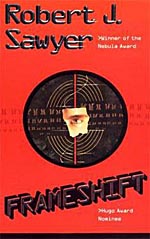
![]() Tar Daddoo
Tar Daddoo
9/29/2013
![]()
What is the Science Fiction Premise?
Frameshift offers two Science Fiction premises. The first and more important addresses genetic knowledge and capabilities, circa 1997, when it was published. One of the novel's key characters is a genetic researcher who is working on the Human Genome Project, which formally began in 1990 and and did not achieve the full sequencing of the human genome until 2003. The other Science Fiction premise is an ability to read minds.
Is the science of the premise explored?
Frameshift is extremely thorough in its discussion of genetics. While I am not a biologist or geneticist, I did not notice any scientific explanations that seemed incorrect. The basics of the genetic code and sequencing are discussed carefully before moving on to more detailed topics. There is some speculation and movement beyond the current state of knowledge and capabilities, but it is not fanciful. Mostly, these seem like extrapolations that may some day be feasible.
As for the ability to read minds, the book is less thorough. While we are not offered any theory of mind-reading, we do learn about its constraints and parameters. It does obey an inverse square law; only articulated (internally verbalized) thought can be detected; and, the mind reader receives the thought as if it is spoken, e.g., it must be in a language she understands. Although the novel focuses more on genetics than mind-reading, this secondary premise is not treated cavalierly.
Is the impact of the premise on an individual explored?
Frameshift is all about how genetics and our knowledge of genetics influences our lives. The lead character is suffering from a debilitating genetic disorder that usually results in a midlife death. Another character breaks off a marriage because of genetic test results. We are greeted with many choices involving whether to have tests, whether to act on the results, and whether to share those results with others. In addition, we observe the consequences of an instance of "genetic manipulation".
For the most part the mind-reading capability is used to advance the plot centered on the genetics. Nevertheless, we are provided an interesting account of how it might feel to grow up with a mind-reading capability. It is definitely not as welcome a gift as one might expect. Moreover, it is clear that it has affected and continues to affect the life and behavior of the mind reader.
Is the impact of the premise on society explored?
Frameshift is greatly concerned about the uses of genetic knowledge in our society. This plays out primarily as a consideration of how genetic information about patients could and would be used by insurance companies. Genetic discrimination was becoming an important topic in the United States in the mid-90s when the book was written.
How well written is the story?
I am quite fond of Robert J. Sawyer's work and find this and his other books easy to read.
I think many readers and even fans of Sawyer could find Frameshift surprisingly down to earth (no pun intended.) The action takes place in the 1990s with references to many events occurring at that time. The Science is only mildly speculative. The mind-reading and one other idea are a bit fantastic, but they are not really essential to the story. They could be removed with a bit of rewriting and then the story would mostly be a contemporary drama.
Can I recommend the book?
I like Frameshift. I consider it a piece of Hard SF based in present day knowledge and technology. Both the Science and the story are satisfying. Although I'm sure many would find the book too tame, preferring more action and more fantastic Science, I am happy to recommend it.